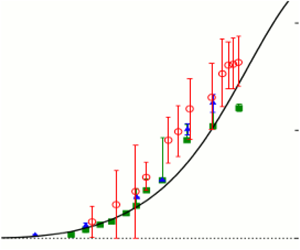Article contents
Tensorial rheological model for concentrated non-colloidal suspensions: normal stress differences
Published online by Cambridge University Press: 13 July 2020
Abstract

Only few rheological models in the literature simultaneously capture the two main non-Newtonian trends of non-colloidal suspensions, namely finite normal stress differences and transient effects. We address this issue by extending a previously proposed minimal model accounting for microstructure anisotropy through a conformation tensor, which was shown to correctly predict transient effects (Ozenda, Saramito & Chambon, J. Rheol., vol. 62 (4), 2018, pp. 889–903). A systematic sensitivity study was performed to provide insights into the physical interpretation of the various model terms. This new model is compared to a large experimental dataset involving varying volume fractions, from dilute to concentrated cases. Both apparent viscosity and normal stress differences in steady state are quantitatively reproduced in the whole range of volume fraction, and qualitative agreement for transient evolution of apparent viscosity during shear reversal is obtained. Furthermore, the model is validated against particle pressure measurements that were not used for parameter identification. Even if the proposed constitutive equation for the Cauchy stress tensor is more difficult to interpret than in the minimal model, this study opens the way for the use of conformation tensor rheological models in applications where the effect of normal stress differences is prominent, like elongational flows or particle migration processes.
- Type
- JFM Papers
- Information
- Copyright
- © The Author(s), 2020. Published by Cambridge University Press
References
- 7
- Cited by


